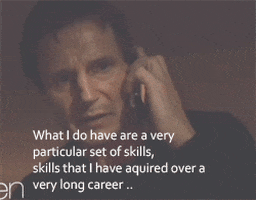Suggestions for coping with veterans' entitlement in this system? I don't mean the things they are actually entitled to. I mean like when they ask for things that they do not have a right to, request services that are not good clinical practice, tell you they need a particular diagnosis and related treatment for their SC claim, act rude/aggressive with you, etc.
My dumb ass went into this believing there is something noble in serving those who served. I don't think I buy the mission anymore. Lately, I'm not sure I even like the average veteran I work with.
My advice is do not avoid or steer away from the conflict. Steadily, professionally, politely, but firmly always lean
into it and deal with it directly as it comes up.
Also, make sure that you heavily research and think very deeply about the issues involved so that you will know that you are on firm ground when you set your feet and hold your boundaries. For example, digging deeply into the literature on the crucial distinction between
clinical vs.
forensic roles and the rationale behind making and keeping that distinction was very helpful when it came time to enforce that boundary with veterans. Also, make sure to know the policy / procedures in support of boundary keeping with veterans on specific issues. For example, for a time I was getting a lot of requests to complete DBQ forms (essentially, establishing a 'nexus' for disability) by my veteran clients. I had to research the issue and found that there was actually a VA policy that
discouraged mental health providers from filling these out (due to the inherent conflict between clinical and forensic roles).
Similar deal with the service dog issue or the 'caretaker' (for PTSD) issue. Know the literature. Know the reasons you have and are willing to enforce a boundary. Have discussions with colleagues although your mileage may vary here. I have open disagreements with colleagues who maintain that writing letters to get veterans to 100% service connected status (have you
seen the actual criteria for 100% s/c for mental health in VA???) or writing letters flatly stating that a veteran is 'unemployable' due to PTSD is their form of 'advocating' for the veteran. They see it as noble. It is not my job to change their minds. I personally think that the most important thing is not to ever lie to or for veterans because you aren't helping them if you're lying. No one who bases their life on a lie is going to be happy for the longer term. Whatever. Know your own principles and boundaries and stick to them.
In the long run I believe it pays off because the veterans who would reject you as their therapist for not lying for them or enabling harmful behavior are going to be the ones who eat up a lot of your time unproductively and lead to burnout.
As far as the malingering/overreporting of PTSD and the whole differential diagnostic issue...that's a tough one at VA. I've seen a lot of folks settle in on one extreme ('rubber stamping' everyone as having PTSD because it's easier just to give people the dx they want') to [what I would consider] the other extreme (doing a CAPS with every single intake and going out of their way to minimize the impact of symptoms or trying really hard to 'dismantle' the diagnosis in those already diagnosed and service-connected). I have found a bit of a 'middle path' that I think makes the most sense for me. Obviously, don't just 'sling PCL-5's' to make the diagnosis. Don't take labels of symptoms at face value. Do good differential diagnostic interviewing employing a semi-structured but thorough interviewing format. Take your time to make the diagnosis (several sessions) if need be. If something doesn't make sense, don't ignore the fact that it doesn't make sense (or is a 'blank' area in the case formulation). Don't fall into the trap of thinking that the veteran somehow 'deserves' a particular diagnosis (they, and sometimes the system itself will pressure you to act this way). There are plenty of cases where objective personality assessment makes sense (MMPI/PAI) and can be used as an additional data point. Use a multi-modal assessment approach and be honest when giving feedback to the veteran. Always remember (yourself) and reinforce with the veteran what the
actual service is that you're offering them (professional psychotherapy) and what that entails. I consider it the ongoing process of 'informed consent' and 'shared-decisionmaking.' Directly ask veterans why they think that they're here (in therapy) and what their goals are. I've (rarely) had veterans come right out and say, 'I just retired and I need 100% to make it financially.' I politely but firmly remind them what psychotherapy is (working on yourself) and that
all that I'm doing is offering them the opportunity to engage in
work (skills-building exercises) to try to (actually)
reduce the level of
actual disability that they experience as a result of their mental health condition and so maybe they aren't actually 'in the market' for the service that I'm offering (and that's okay, it's their choice). Sometimes it is actually helpful to remind them that if their actual goal is to increase the level of disability/SC rating then that would mean that their goal is literally pointed in the exact OPPOSITE direction of psychotherapy. I've shared this with colleagues that I have this discussion with veterans who are persistent about increasing their SC ratings and they act like I just went flatulent in church or something.
I've made it a little over a decade at VA as a MH provider (leaning into conflict on these issues, holding my ground, etc.) and just want to make it to retirement in another 10-11 years. Maybe I will or maybe I won't. But I will NOT live my professional life as a professional liar and call myself 'advocating for veterans' by lying. Just can't/won't do that. If they fire me or trump up some charges or whatever or if an angry antisocial veteran takes me out with a tire iron one day in the parking lot I don't even care at this point. I am not living my life in fear of not lying. If the veteran wants to lie to me (in detail) in order to get the PTSD diagnosis in a treatment context...guess what...they CAN. Don't care. But I am not lying (making up the details, connecting non-existent dots)
for them in order to just 'go along to get along.' That's how we got here in the first place. And I've had former special forces/ combat arms veterans disclose that they avoided getting a PTSD dx and treatment like the plague (even though they clearly had it and it destroyed their lives and marriages and almost drove them to suicide) because they know so many people who abuse the system and they equate the PTSD dx with malingering. And, to a very large extent...they're not wrong. So, no, I don't think that I would be nobly 'advocating' for veterans by giving a PTSD diagnosis when I don't believe for a second that it applies. In the end, I'm keeping people who actually have the diagnosis away from seeking the help that they need. I think a
lot of the very public statements of 'I'm an
advocate for veterans because I write letters or I give the dx to everyone' bullcrap is simply a pathetically shallow and hollow attempt to paint over people's own cowardice, laziness, and lack of responsibility.
And one other thing (since I'm ranting). It may be in five, ten, or even fifty years but at
some point everyone is going to look back on this time as a massive embarrassment for the field of psychology. There is so much disability (VA, SSDI) fraud going on in the mental health arena it is unbelievable and it is clearly unsustainable. The economic/social fallout is going to be a 'bill that comes due' some day and they will write about the psychologists of this era in, I predict, a very unflattering way.
Good luck to you.


